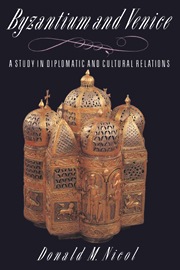Book contents
- Frontmatter
- Contents
- Dedication
- Preface
- List of abbreviations
- Maps of the Byzantine and Venetian worlds
- 1 Venice: the Byzantine province
- 2 Venice: the Byzantine protectorate
- 3 Venice: the ally of Byzantium
- 4 Venice: the partner of Byzantium
- 5 Byzantium, Venice and the First Crusade
- 6 The parting of the ways
- 7 The calm before the storm
- 8 The Fourth Crusade
- 9 Venice in Byzantium: the Empire of Romania
- 10 Venice: champion of a lost cause
- 11 Byzantium, Venice and the Angevin threat
- 12 Byzantium, Venice and Genoa
- 13 Conflicting interests and competing claims
- 14 Byzantium, Venice and the Turks
- 15 Byzantium: the victim of commercial rivalry
- 16 The profit and honour of Venice
- 17 Jewels for an island
- 18 Byzantium in thrall to the Turks and in debt to Venice
- 19 Byzantine optimism and Venetian vacillation
- 20 Byzantium the suppliant of Venice
- 21 The worst news for all of Christendom: Venice and the fall of Constantinople
- 22 Legacies and debts
- Byzantine Emperors
- Doges of Venice
- Bibliography
- Index
19 - Byzantine optimism and Venetian vacillation
Published online by Cambridge University Press: 01 April 2010
- Frontmatter
- Contents
- Dedication
- Preface
- List of abbreviations
- Maps of the Byzantine and Venetian worlds
- 1 Venice: the Byzantine province
- 2 Venice: the Byzantine protectorate
- 3 Venice: the ally of Byzantium
- 4 Venice: the partner of Byzantium
- 5 Byzantium, Venice and the First Crusade
- 6 The parting of the ways
- 7 The calm before the storm
- 8 The Fourth Crusade
- 9 Venice in Byzantium: the Empire of Romania
- 10 Venice: champion of a lost cause
- 11 Byzantium, Venice and the Angevin threat
- 12 Byzantium, Venice and Genoa
- 13 Conflicting interests and competing claims
- 14 Byzantium, Venice and the Turks
- 15 Byzantium: the victim of commercial rivalry
- 16 The profit and honour of Venice
- 17 Jewels for an island
- 18 Byzantium in thrall to the Turks and in debt to Venice
- 19 Byzantine optimism and Venetian vacillation
- 20 Byzantium the suppliant of Venice
- 21 The worst news for all of Christendom: Venice and the fall of Constantinople
- 22 Legacies and debts
- Byzantine Emperors
- Doges of Venice
- Bibliography
- Index
Summary
Among the prisoners of rank taken by the Turks at Nikopolis was a French knight, Jean le Meingre, known as Marshal Boucicaut. The Sultan had set him free on parole to raise the ransom money for the other distinguished prisoners-of-war. Like Amadeo of Savoy, Boucicaut was an intrepid and adventurous soldier. He longed to take his revenge on the infidel. When he returned to France he reported to his sovereign lord, King Charles VI. Charles was well briefed on eastern affairs and still mourning the loss of so many of his subjects at Nikopolis. The Emperor Manuel had often written to him begging for his help; and he had an extra interest in Constantinople since, in 1396, he became overlord of Genoa and so of the Genoese at Galata and elsewhere in the Byzantine world. It was even rumoured that Manuel's nephew, John VII, had thought of selling his title to the Byzantine crown to the French king in 1397. Marshal Boucicaut had been to Constantinople and had probably met the emperor. He knew the situation at first hand. In June 1399 Charles VI asked him to lead a small expedition to the relief of the city. He accepted with enthusiasm.
Boucicaut's little crusade grew in numbers and in strength as it made its way east, though it never amounted to more than 1200 men. The Genoese were slow to provide the ships required of them; but Venice surprisingly contributed eight galleys. They assembled at Tenedos and fought their way through the Turkish blockade in the straits, disembarking at Constantinople in late summer.
- Type
- Chapter
- Information
- Byzantium and VeniceA Study in Diplomatic and Cultural Relations, pp. 338 - 357Publisher: Cambridge University PressPrint publication year: 1989



